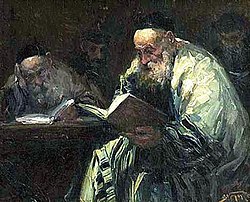


| Rabbinic literature | ||||||||||||
|---|---|---|---|---|---|---|---|---|---|---|---|---|

Talmud ReadersbyAdolf Behrman
| ||||||||||||
| Talmudic literature | ||||||||||||
|
||||||||||||
| Halakhic Midrash | ||||||||||||
|
||||||||||||
| Aggadic Midrash | ||||||||||||
|
||||||||||||
| Targum | ||||||||||||
|
||||||||||||
|
|
The Alphabet of Sira (Jewish Babylonian Aramaic: אלפא-ביתא דבן סירא, romanized: Alpā-Bethā də-Ben Sirā) is an anonymous text of the Middle Ages inspired by the Book of Sirach and written in a Muslim country between 700 and 1000. It is a compilation of two lists of proverbs, 22 in Jewish Babylonian Aramaic and 22 in Medieval Hebrew, both arranged as alphabetic acrostics. Each proverb is followed by an aggadic commentary. Adolf Neubauer and Abraham Epstein argued for a satirical character, which reading was rejected by Louis Ginzberg.[1]
It has been translated into Latin, Yiddish, Judaeo-Spanish, Judeo-Persian, French and German. An English translation by Norman Bronznick appeared in Stern and Mirsky (1998). A critical edition under the title סיפורי בן סירא בימי הביניים was published by Eli Yassif in 1984.[2]
The Aramaic proverbs are the older part of the book. Five of them can be traced to Talmudic-Midrashic literature. The Hebrew commentary, illustrating the proverbs with fables, is much younger.
In the reading of Ginzberg:[1]
The 22 Hebrew proverbs are quite different in character from the Aramaic ones, and much more recent. Half of the proverbs are borrowed from the Talmud, and are only a pretext for the presentation of a number of legends surrounding Ben Sira. Ben Sira is presented as the son of Jeremiah, born to the prophet's own daughter who dipped in a mikveh into which Jeremiah was previously forced to lay seed. Ben Sira's fame reached Nebuchadnezzar II, who called him to his court. Nebuchadnezzar sets forth various ordeals for Ben Sira, who responds with 22 stories.
| International |
|
|---|---|
| National |
|
| Other |
|